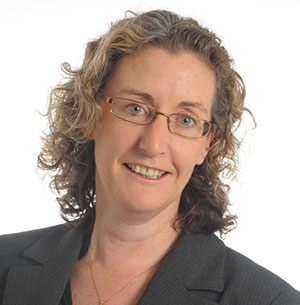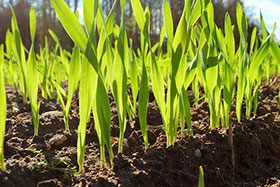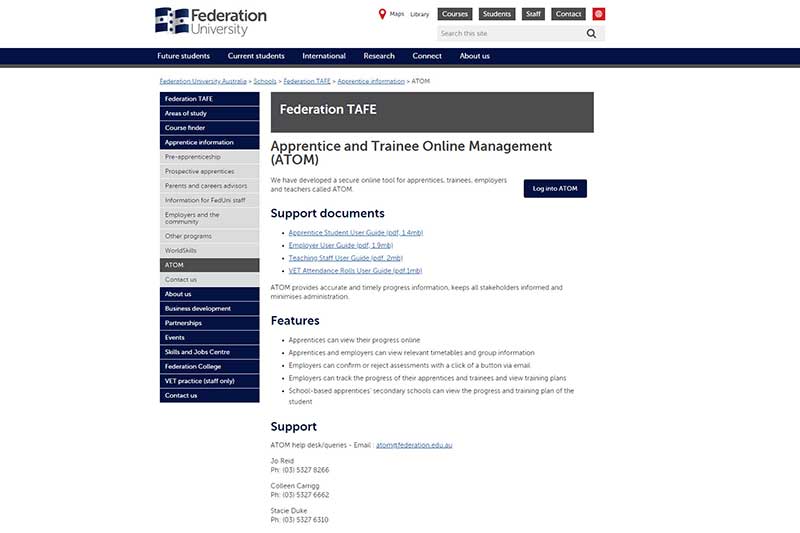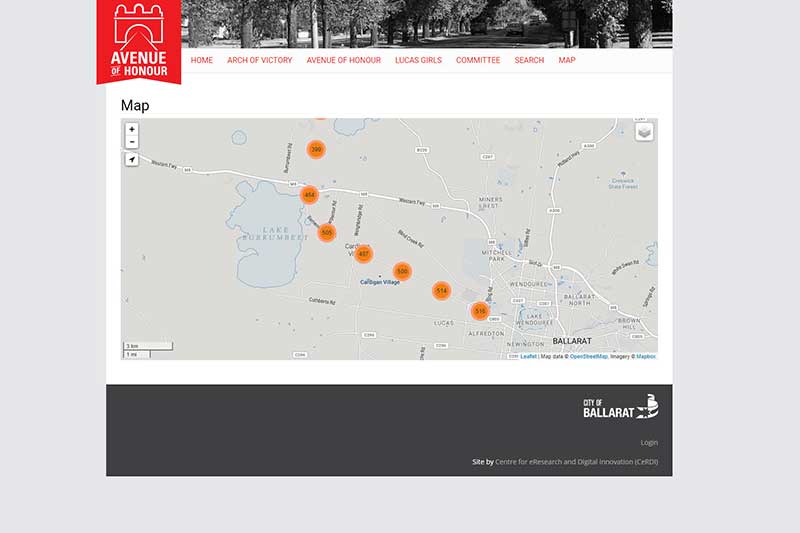
CeRDI Newsletter Autumn 2020
In this issue:
- Message from the Director
- Managing and enabling soil data
- Climate Change Land Capability and Capacity Project
- Youth C.A.N. project: A model for success
- Smart Cities and Ballarat Open Data platform
- ATOM upgrades
- Energy Data Roadmap
- Avenue of Honour project
- Vale Dr David Ebbs
- Student Profile: Peter Weir
- CeRDI news snippets
- CeRDI postgraduate news
- About CeRDI
- Contact CeRDI
Message from the Director
 |
|
|
Associate Professor |
|
This latest newsletter highlights the research and innovation that CeRDI has progressed in the last quarter. Although the COVID-19 pandemic has caused change in our work practices, research and technology developments have continued, with CeRDI staff work remotely to progress projects and achieve associated milestones.
Substantial progress has been made on two new data platforms. First, the Climate Change Land Capability and Capacity Project for the Southern Gippsland region will provide farmers with a new platform for support and decision making for climate change. Second, the Ballarat Open Data platform, which is also in development, will provide new data sharing opportunities for the Ballarat community. Both data platforms will provide users with data access, generating new insights for better decision making and planning.
VicHealth recently released a set of resources associated with the Alcohol Cultures and Reducing Alcohol Harm program. The Youth C.A.N. project, a collaboration between CeRDI and Horsham Rural City Council, was included in this resource as a case study for best practice. This is an exciting outcome culminating from the extensive research conducted.
A new project with funding from the Soli CRC will offer information and consolidation of soil data for Australia. This project will further complement CeRDI’s research in soils and agriculture areas.
Project to manage and enable soil data
 |
|
|
The Improved soil data management |
|
CeRDI’s Dr Nathan Robinson and colleagues were recently notified of funding success to develop a comprehensive online platform providing Australian farmers with access to the latest research and information about soil. The project, ‘Improved soil data management’, will be led by Federation University (CeRDI) and delivered through the Soil Cooperative Research Centre (Soil CRC), a collaboration between universities, state government agencies, grower groups and industry from across Australia. Project partners include Charles Sturt University, Manaaki Whenua Landcare Research New Zealand, NSW Department of Primary Industries and The University of Tasmania.
Until now, consolidated information about Australian soils has not been readily available. Soil data is disparate, and is not easily or widely accessible. This has restricted a farmer’s ability to access soil research that could benefit them and the industry.
Climate Change Land Capability and Capacity Project
.png) |
|
|
Climate Change Land Capability and |
|
CeRDI is working with Bass Coast Landcare and colleagues from Federation University’s Gippsland campus to develop a Climate Adaption Planning Tool for the Growing Southern Gippsland project.
Work on the decision support tool is being completed at CeRDI following extensive planning which was informed by feedback from over 200 local farmers. The tool will assist Southern Gippsland landowners in making decisions about managing their agricultural enterprises in parallel with predictions relating to the impact of climate change. The tool will enable landowners and farmers to prepare and plan for change in their region.
The tool will be structured into four main themes to assist with informed decision-making. These include ‘land and ecosystem’, ‘water and rainfall’, ‘temperature and wind’ and ‘business and operations’. The tool will include additional data to support decision making. For example, climate data and soil data for the region will be available via the tool. This data will provide access to climate projection data for regions across Victoria, enabling visualisations of rainfall, temperature and humidity.
Youth C.A.N. project: A model for success
.png) |
|
|
VicHealth Website |
|
VicHealth recently released a set of resources to assist practitioners and communities to understand alcohol cultures and reducing alcohol harm. The guide for supporting practitioners to use the Alcohol Cultures Framework includes exemplary case studies from three community alcohol culture change initiatives. One of the case studies is the Youth Changing Alcohol Norms (Youth C.A.N.) project where CeRDI was a key collaborator.
The Youth C.A.N. project commenced in 2016 following the awarding of funding from VicHealth. Co-ordinated by Horsham Rural City Council (HRCC), the project aimed to capture insights to inform an understanding of the current practices of alcohol consumption and alcohol misuse in the region, and to identify opportunities for cultural change to reduce alcohol use. CeRDI conducted extensive research to evaluate the project which, under the leadership of Dr Angela Murphy, culminated in the release of the final report late last year. The report incorporates extensive research findings from the project and how it has been supported and benefitted culture change around alcohol for young people in the region.
Smart Cities and Ballarat Open Data platform
 |
|
|
Town Hall and Sturt St Ballarat |
|
A successful collaboration between the City of Ballarat and Federation University has led to the creation of an innovative, open data sharing platform for the community. To be launched in coming months, Ballarat Open Data will provide a platform for community data sharing that will enable greater regional innovation through data driven decision making, and offer new opportunities by harnessing the Internet of Things.
Preliminary work associated with the development of this platform has involved pilot studies and the implementation of smart sensors and devices for evidence-based decision making. The studies have informed the understanding of, and opportunities for the Internet of Things and new technology infrastructure, through the open LoRaWAN (Long Range, low power Wide-Area Network) service for the region.
ATOM upgrades
 |
|
|
Federation University’s Apprenticeship |
|
Federation University’s Apprenticeship and Trainee Online Management system – known as ATOM – has recently undergone significant upgrades and refinements to improve the overall user experience.
First developed by CeRDI in 2012, the system was implemented to provide Federation University TAFE apprentices, trainees, employers and teachers with a secure, online tool for managing training plans and for meeting Federation TAFE compliance with Apprentice Training Plans and Attendance.
ATOM is an innovative and intuitive online management system providing accurate and timely information enabling stakeholders (employers, apprentices and educators) to remain informed about all aspects of educational and placement progress for apprentices and trainees. The implementation of the online tool has significantly reduced the onerous administrative procedures that users previously experienced in managing study training and apprenticeships.
Energy Data Roadmap
 |
|
Federation University’s School of Engineering, IT and Physical Sciences and CeRDI have collaborated on research, funded by the Centre for New Energy Technologies (C4NET), to better understand the availability of energy data (consumption data) in Victoria.
Desktop activities have now been completed, providing an overview of the energy trends, influences and drivers in the industry. Interview and survey data was also collected from key stakeholders from across the energy industry. The key insights have been analysed and consolidated into a draft report for C4NET to assist with informing their work and future priorities for improvements to energy data flows in Victoria.
It is anticipated that this research will generate new insights and provide an important roadmap of the energy data available within Victoria. The project will be completed in coming weeks, culminating in a final report.
Avenue of Honour project
 |
|
|
Ballarat Avenue of Honour |
|
CeRDI received a small grant to assist the Ballarat Avenue of Honour Committee improve the spatial accuracy of The Avenue’s trees and commemorative plaques. Until recently, only un-corrected GPS had been used to document the 3600 trees along The Avenue. This work was completed many years ago, and with modern photography there were recent indications that the documentation of tree points was out of position.
Free access to high resolution imagery collected during winter 2019 when the leaves had fallen from the trees and their trunks and bases were visible was supplied by EagleView. The new imagery enabled the relocation of tree points to the correct position.
Vale Dr David Ebbs
It was with great sadness that we learnt that our friend and colleague, Dr David Ebbs, passed away in April.
David was a well-respected colleague in CeRDI, having joined the Centre as a PhD student in 2015. David’s PhD research examined the harvesting of stormwater and testing the paradigm by assessing the impacts through an inter-disciplinary case study. David submitted his thesis for examination in early 2019 and was awarded his degree during a graduation ceremony late last year.
During his time as a student, David published widely from his research and presented at conferences in Australia and New Zealand. In 2018, David participated in an internship with City West Water, though the Australian Postgraduate Research (APR) Intern program. David also contributed to project management activities in the Centre, and lectured in undergraduate courses across Federation University’s science and engineering programs.
David was a friend and mentor to many and was incredibly supportive to staff and students across CeRDI and the University. His strength of character, his intelligence and enthusiasm will be hallmarks long remembered from his CeRDI time.
Student Profile: Peter Weir
.jpg) |
|
|
Peter Weir |
|
Peter commenced his PhD at CeRDI in February 2020. The aim of his research is to develop a conceptual model, using existing spatio-temporal data as the basis for predictions of within-paddock variability in plant-available water (PAW), which will consider local constraints, and uncertainty in the data. Assuming a credible and robust fine-scale PAW model can be achieved, the variation in annual yields against the variations in seasonal PAW could be correlated to elicit information about the paddocks and soils that can feed into predictive models. Predictions will be based on a range of publicly available data sets including satellite imagery, landscape metrics, soil moisture measurements, digital soil data, and meteorological data. Multi-variate statistical analysis and machine learning techniques will be used to develop the prediction algorithms.
After many years in irrigated horticulture in the Riverland, South Australia, both as a farmer and a software developer, Peter returned to fulltime study in 2008 at the University of South Australia, Adelaide, obtaining an Information Technology degree with Honours (2012). His Honours thesis was titled "Evaluation of Psychophysical Effects in High Quality Augmented Reality Environments". At that time, his research interest was the objective measurement of the perceptual experiences of individuals using Augmented Reality systems, studying how our brains process multimodal sensory stimulation as we experience the world around us.
CeRDI news snippets
Conference presentations. Dr Megan Wong recently presented at the C3DIS conference:
Creative Commons Certificate. Dr Judi Walters recently completed a certificate course through Creative Commons. The three-month course involved online lessons and an extensive swathe of assignments. Judi relayed the learnings from the course regularly to the CeRDI team, using innovative formats to convey new insights in this area. Creative Commons (CC) is a non-profit organisation that aims to expand the range of creative works and data available for others to share and legally build upon. The organisation’s copyright-licenses, known as Creative Commons licenses, are particularly applicable to information made available online, and application of various CC licences and tools for CeRDI’s Online Farm Trials project is being investigated.
CeRDI postgraduate news
Confirmation of Candidature and Student Scholarship. Congratulations to Elissa Ashton-Smith on successfully completing her confirmation of candidature in March. Elissa's PhD research is examining perceptions of nature and the values and worldviews that influence the way people interact with the natural coastal environment. Elissa was also the successful recipient of a Bill Borthwick Student Scholarship. The student scholarship funds will assist with facilitating activities associated with Elissa’s PhD data collection. For more about Elissa’s research visit: www.cerdi.edu.au/cb_pages/elissa_ashton-smith.php
Food Agility Scholarship. Congratulations to Andrew MacLeod who recently received and accepted an offer of a full scholarship from the Food Agility CRC. Andrew’s research project is titled Advancing syntactic and semantic interoperability for data in the agricultural and food industries. His supervisory team includes Associate Professor Pete Dahlhaus, Dr Nathan Robinson, Simon Cox (CSIRO) and Cam Nicholson (Nicon Rural). Andrew will commence his studies later in the year.
About CeRDI
The Centre for eResearch and Digital Innovation (CeRDI) is a research centre at Federation University Australia focused on:
- the application of information and communications technology (ICT) and the development of innovative, world class knowledge management systems;
- significantly advancing the digital literacy and knowledge management capabilities of partner organisations;
- fostering partnerships for the development and implementation of eResearch with industry, government and academia; and
- measuring the impact of eResearch and digital innovation through longitudinal research.
Contact CeRDI
For further details about CeRDI’s diverse portfolio of research please visit our website: www.cerdi.edu.au, or contact Director, Associate Professor Helen Thompson: h.thompson@federation.edu.au
Mailing Address
Centre for eResearch and Digital Innovation
Federation University Australia
PO Box 691
Ballarat Vic 3353
Office Location
Suite 15, Greenhill Enterprise Centre
Ballarat Technology Park
University Drive
Mount Helen Vic 3350
Phone: +61 3 5327 9314
Email: support@cerdi.edu.au
Subscribe to the CeRDI Newsletter Mailing List
I would like to subscribe to the CeRDI Newsletter Mailing List to receive notifications of future CeRDI Newsletters.
If you have any feedback, please email newsletter@cerdi.edu.au
